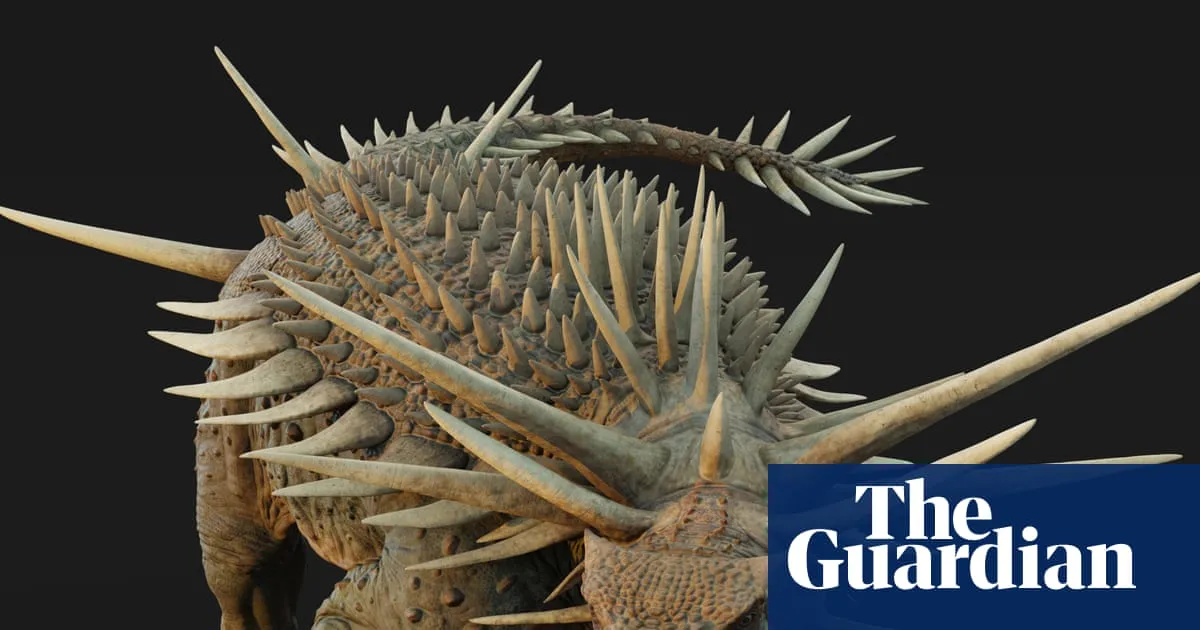
Spicomellus afer, with its tank-like physique, is an extraordinary dinosaur that roamed the floodplains of what is now North Africa approximately 165 million years ago. This fascinating creature, adorned with body armor and a collar of spikes the length of golf clubs, resembles a character straight out of a Pokémon game rather than a living dinosaur. Recent findings by paleontologists have shed light on this bizarre specimen, which is the oldest known ankylosaur fossil.
The fossil of Spicomellus afer was discovered near the central Moroccan town of Boulemane. Its extravagant armor has raised new questions about the evolutionary development of ankylosaurs, a prominent group of herbivorous dinosaurs. Professor Richard Butler, from the University of Birmingham and a co-lead of the research project, stated, “It’s absolutely bristling with spikes all over its body.” He further described the dinosaur’s anatomy, noting the impressive armoured collar around its neck, which is notably disproportionate to the rest of its body.
Despite the incomplete jumble of fossilized bones, reconstructing the body plan of Spicomellus afer proved to be a challenging task for researchers. Professor Butler explained, “We put all the armor out on a table and tried to figure out where, most logically, it would fit.” Ankylosaurs existed from the mid-Jurassic to the late Cretaceous epoch, a period that ended with an asteroid impact that led to the extinction of many species. They are typically recognized for their squat, slow-moving, heavily armored physiques, which contributed to their survival for an impressive span of around 100 million years.
Spicomellus afer is estimated to have reached a length of about 4 meters (approximately 13 feet) and weighed around two tonnes. Although the fossil is missing the end of its tail, the presence of fused vertebrae suggests it likely ended in a club-like structure. This feature may have been used as a weapon against rivals or predators, indicating that adaptations for tail weaponry developed around 30 million years earlier than previously believed.
While the more modest body armor of later ankylosaurs is often interpreted as a form of physical defense, the extravagant spikes of Spicomellus afer are more suggestive of displays for dominance or mating. Professor Butler remarked, “When you see the neck collar of this thing, it seems like total overkill. It does seem like the kind of thing that would’ve complicated its life.”
One significant challenge in studying Spicomellus afer is the issue of fossil poaching in Morocco. The excavation site has been targeted by fossil hunters, which has hampered research efforts. The study relied heavily on approximately half of the skeleton, currently held at the Dhar El Mahraz Faculty of Sciences in Fez. Disturbingly, fossilized bones believed to belong to the same specimen have been sold online for prices reaching up to £10,000. Professor Butler expressed concern, stating, “There’s a huge problem with fossil poaching in Morocco. Bits of this specimen have been for sale in the market in Europe and North America.”
The plight of Spicomellus afer highlights the broader issue of fossil conservation and the risks posed by the illegal fossil trade, which often sees significant specimens being purchased by wealthy collectors rather than remaining accessible for scientific research. This sad aspect of the story underscores the importance of preserving our paleontological heritage.